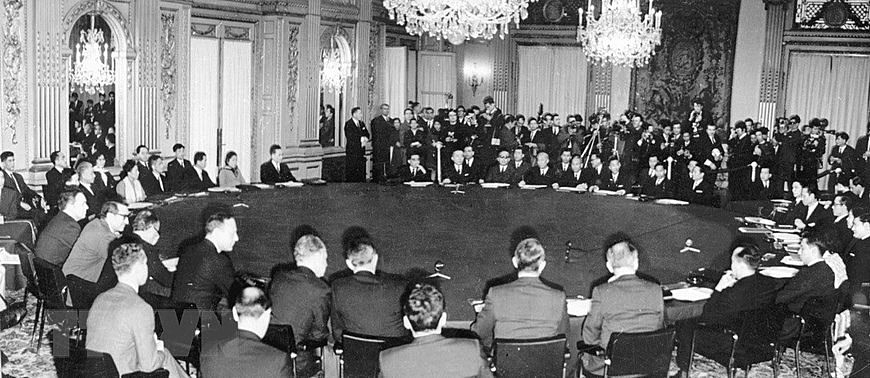 |
| The first session of the Four-Party Conference on Vietnam on January 18, 1969 in Paris. Photo: VNA |
The first lesson lies with the Party’s sound leadership, which opened up the diplomatic front and carried forward strengths of the diplomatic sector, in combination with political and military fronts and the “fight and talk” strategy, creating common strength to win the victory.
The second was persistently pursuing the foreign policy of independence and self-reliance, for the sake of the nation; properly applying President Ho Chi Minh’s diplomatic motto of “Di bat bien, ung van bien” (“Keeping calm is to cope with multi-unexpected changes”), creating opportunities, forcing the enemy to join negotiations, proactively conducting diplomatic attacks and ending negotiations when conditions are right; harmoniously handling relations with major countries, and at the same time utilizing the widespread international support for the struggle to make the Paris Conference a victory.
The third reflected the significance of potentiality, as President Ho Chi Minh described potentiality as a gong and diplomacy as its sound, stressing “Big gongs make big sounds.” The victory of the Paris Conference came from triumphs on the battlefield, Vietnam’s increasingly growing position and potentiality during the struggle against the US. It was the power of justice, the great national unity bloc under the sound leadership of the Party and with international support, as well as the ingenious combination of political, military and diplomatic fronts, the “fight and talk” strategy, and the combination of battlefields and negotiations.
The fourth was associated with national and international solidarity. To sail through huge challenges, the combination of national and international solidarity, and the strength of the nation and the era had been seen as a very crucial method. Vietnam won victory in the fight for national independence and reunification as the country knew how to uphold the great national unity bloc, support from socialist countries and peace-loving people worldwide, and strictly follow President Ho Chi Minh’s teaching about unity – the key to success.
Another lesson was force building. From the 1954 Geneva Conference to the Paris Conference, the contingent of diplomats had grown tremendously and been well-equipped with both knowledge about external affairs and negotiation skills. Along with close instructions, the Party and State selected and assigned the most outstanding diplomats to participate in the negotiations, significantly contributing to the victory of the Paris Conference.
Such lessons have been considered valuable baggage for Vietnam to firmly step into the period of international integration, make its friendship and relations with all partners intensive, stable and sustainable, and consolidate and elevate its position and potentiality./.
|
The Paris negotiations lasted for nearly five years, with bilateral talks from May 13 to October 31, 1968, and four-party talks from January 25, 1969 to January 1973. After 201 open sessions, 45 high-level private talks, 24 secret meetings, 500 press conferences, 1,000 interviews and hundreds of get-togethers in support of Vietnam, the Paris Agreement on Ending the War and Restoring Peace in Vietnam (Paris Peace Accords) was signed on January 27, 1973 by the Democratic Republic of Vietnam, the National Front for the Liberation of South Vietnam, the Republic of Vietnam, and the US. The agreement put an end to the longest and most difficult struggle in the history of Vietnam’s diplomacy. |
Vietnam’s everlasting power: Unity and Solidarity
Your homeland ask you to stay strong and positive. The will power of our people will not be crumble.








